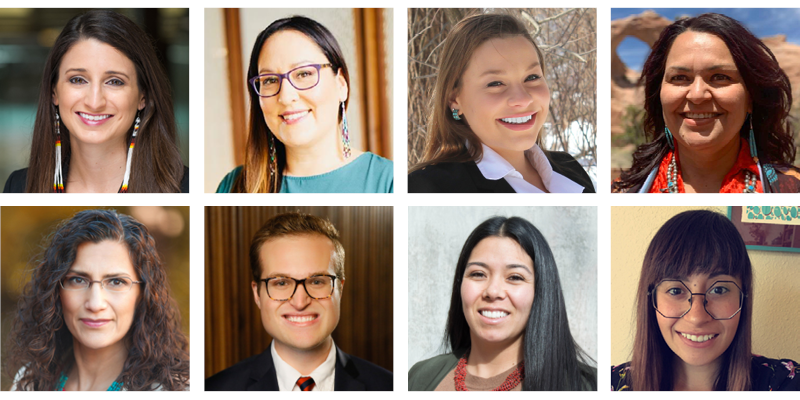The Pre-Law Summer Institute (PLSI) Judicial Clerkship Committee that includes ILP alumni teamed up and created the Judicial Clerkship Handbook to advise and encourage Native American law students interested in judicial clerkships across all levels of courts, including tribal courts.
PLSI Judicial Clerkship Committee:
- Racheal White Hawk (’16), Chair
- Christine Jordan, Member
- Lydia Locklear, Member
- Doreen McPaul (’01), Member
- Rodina Cave Parnall (’01), Member
- Alexander Mallory (’19), Member
- Roshanna K. Toya, Member
- Kateri Eisenberg
Who better to offer advice than those who have served in these positions? White Hawk, former Judicial Clerk, U.S. Court of Appeals for the Ninth Circuit and Arizona Supreme Court; Parnall, former Judicial Clerk, U.S. Court of Appeals for the Ninth Circuit; Mallory, current Judicial Clerk, U.S. Immigration Court, Department of Justice Honors Program; and McPaul, former Judicial Clerk, Arizona Court of Appeals and former Staff Attorney, Navajo Nation Judicial Branch.
Q: What is the importance of this project?
A: This Judicial Clerkship Handbook is a product of the Pre-Law Summer Institute (PLSI) Judicial Clerkship Committee, which consists of current and former Native American judicial clerks. The Handbook provides the unique perspective and advice of such judicial clerks about the sometimes mystifying judicial clerkship application process and is targeted toward Native American pre-law and law school students. Such students comprise an important audience because Native Americans are vastly underrepresented as not only judicial clerks but also as judges in America, and there has long been a connection between clerking in the judiciary and eventually becoming a judge. It is, therefore, essential that Native Americans are able to obtain clerkships and thereby participate in the pipeline to the judiciary. Ultimately, the Handbook seeks to improve America’s judicial systems by ensuring the rich diversity of the American people is reflected in such systems, including the people indigenous to this land. The Handbook also includes robust sections discussing tribal court clerkships, ensuring that students are made aware of such clerkships and funding opportunities as well as ensuring that tribal courts are included in the discussion about judicial systems in America.
Q: What made you decide to create the handbook?
A: Each year, the PLSI Judicial Clerkship Committee selects several Native American students to attend the American Bar Association’s Judicial Clerkship Program, which connects students with judges and provides information to students about the clerkship experience and application process. Such students must submit application materials to the Committee that are similar to what students would submit for a judicial clerkship application. We noticed that some students needed assistance with their application materials, so we decided to create this resource to assist those and other students in need of guidance. We also recognized that many judicial clerkship handbooks did not discuss tribal courts and did not include the unique perspective of Native American students or advice regarding how to discuss a student’s federal Indian law experience or valuable experiences that might be different from the typical judicial clerkship applicant. Each year, we will provide this Handbook to Native American pre-law students as a resource and to the National Native American Law Students Association. We think it is important that Native American pre-law students in particular be made aware of judicial clerkships so they can better align their law school experience with becoming a judicial clerk if they wish to pursue such a path.
Q: What are you most anticipating moving forward with this project?
A: We hope Native American students will find the Handbook helpful in applying for judicial clerkships and that the number of Native Americans clerking and becoming judges will increase over time. We also plan to continue improving the Handbook each year. As part of this Handbook, we are also starting a mentoring program in the fall of 2021 by connecting current and former Native American judicial clerks with Native American pre-law and law school students. We hope this Handbook will help mentees prepare for, and mentors provide guidance about, the judicial clerkship application process.
________
Racheal White Hawk (’16)
Associate Attorney, Procopio, Cory, Hargreaves & Savitch, LLP
+
Rodina Cave Parnall (’01)
Director, Pre-Law Summer Institute, American Indian Law Center, Inc.

